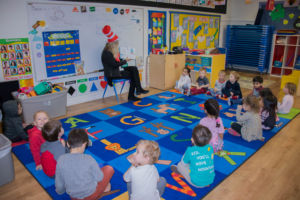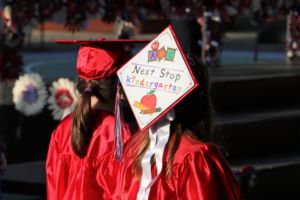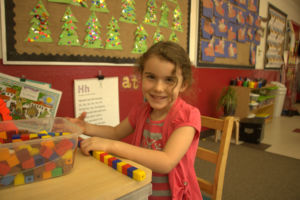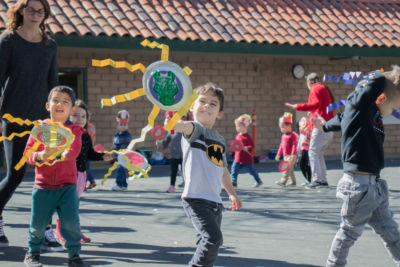Curriculum
We believe it is essential to present developmentally appropriate reading and mathematics concepts at this young age in order to prepare our students for Kindergarten and beyond. In addition to specially-designed reading, writing and mathematics programs, we also tailor our core curriculum to these young, imaginative minds by presenting language and math concepts in fun, hands-on ways, such as dramatic play, story time, cooking and science.
 Reading
Reading
“Happily Ever After” literacy program utilizes children’s literature as the foundation for reading skills. By hearing and discussing stories together, dictating stories, and watching teachers create written words, children begin to understand the correlation between spoken and written word, and that written words can symbolize their thoughts.
Reading
“Happily Ever After” literacy program utilizes children’s literature as the foundation for reading skills. By hearing and discussing stories together, dictating stories, and watching teachers create written words, children begin to understand the correlation between spoken and written word, and that written words can symbolize their thoughts.
 Writing
Writing
“Handwriting without Tears” uses developmentally appropriate and multisensory methods to tackle handwriting. The program groups letters together in terms of difficulty level and types of strokes necessary, so that children are mastering “easy” letters first, gaining confidence, and then moving onto letters that are more challenging. Children use workbooks to practice their skills, but much of the lessons take place through playing, singing and building, helping them to develop their fine motor skills and letter recognition abilities.
Writing
“Handwriting without Tears” uses developmentally appropriate and multisensory methods to tackle handwriting. The program groups letters together in terms of difficulty level and types of strokes necessary, so that children are mastering “easy” letters first, gaining confidence, and then moving onto letters that are more challenging. Children use workbooks to practice their skills, but much of the lessons take place through playing, singing and building, helping them to develop their fine motor skills and letter recognition abilities.
 Mathematics
Mathematics
Math concepts are taught using the “Math Their Way” curriculum, and are also integrated into other activities throughout each day. From the shapes we introduce during art time to the ingredients we measure during a cooking activity, we utilize every opportunity to help children understand the foundations of thinking mathematically. We also formally introduce numbers and counting processes, and then reinforce these concepts throughout the day, such as counting objects we find on the play yard or patterning objects towards which the children gravitate.
Mathematics
Math concepts are taught using the “Math Their Way” curriculum, and are also integrated into other activities throughout each day. From the shapes we introduce during art time to the ingredients we measure during a cooking activity, we utilize every opportunity to help children understand the foundations of thinking mathematically. We also formally introduce numbers and counting processes, and then reinforce these concepts throughout the day, such as counting objects we find on the play yard or patterning objects towards which the children gravitate.
 Social Emotional Learning
Social Emotional Learning
In our early learning classrooms, children are developing invaluable social-emotional skills that help them navigate their way through school as well as their community. Through evidence-based games, activities, stories, songs, and discussions, children are engaged and learning to listen, pay attention, self-regulate, and get along with others. These are some of the skills which will set children on a path to lifelong success in school, home, and the world.

Social Emotional Learning
In our early learning classrooms, children are developing invaluable social-emotional skills that help them navigate their way through school as well as their community. Through evidence-based games, activities, stories, songs, and discussions, children are engaged and learning to listen, pay attention, self-regulate, and get along with others. These are some of the skills which will set children on a path to lifelong success in school, home, and the world.


